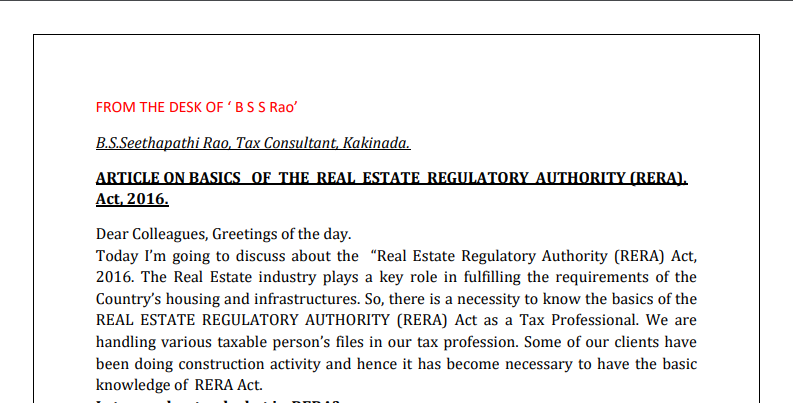Basics of The Real Estate Regulatory Authority (RERA), Act, 2016.
- Basics of The Real Estate Regulatory Authority (RERA), Act, 2016.
- Let us understand what is RERA?
- 1. What is the Real Estate Regulatory Authority (RERA)?
- 2. What is the intention of the Government in introducing the Real Estate Regulatory Authority (RERA) in India?
- 3. Is it mandatory to register with Real Estate Regulatory Authority (RERA) by every builder or developer as per the RERA Act, 2016?
- 4. Which projects come under the Real Estate Regulatory Authority (RERA)?
- 5. How to register projects under RERA by Builder, or Developer?
- Read & Download the full copy in pdf:
Basics of The Real Estate Regulatory Authority (RERA), Act, 2016.
Dear Colleagues, Greetings of the day.
Today I’m going to discuss the “Real Estate Regulatory Authority (RERA) Act, 2016. The Real Estate industry plays a key role in fulfilling the requirements of the Country’s housing and infrastructures. So, there is a necessity to know the basics of the REAL ESTATE REGULATORY AUTHORITY (RERA) Act as a Tax Professional. We are handling various taxable person’s files in our tax profession. Some of our clients have been doing construction activity and hence it has become necessary to have the basic knowledge of RERA Act.
Let us understand what is RERA?
What are the responsibilities of builders and contractors under RERA? What are the responsibilities of buyers under RERA? What are the objects of RERA and how will RERA impact on homebuyers? Which projects come under RERA? What are the statutory obligations of Builders and Buyers? Whether registration of a project is mandatory and if mandatory what is the information to be provided to the Regulatory Authority?
1. What is the Real Estate Regulatory Authority (RERA)?
The Real Estate (Regulation and Development) Act, 2016, enacted by the Parliament establishes RERA in each State for regulation of the Real Estate Sector. It also acts as an adjudicating body for speedy dispute resolution. The bill was passed by the Rajya Sabha on the 10th March 2016 and by the Lok Sabha on the 15th March 2016. The Act came into force on the 1st of Mar 2016 and some provisions became operative from the 1st of May 2017.
2. What is the intention of the Government in introducing the Real Estate Regulatory Authority (RERA) in India?
The Government of India has received complaints from the home buyers that real estate transactions were unequal and densely in favor of the developers. The government’s aim is to create a more equitable and fair transaction between the seller and the buyer of properties, especially in the primary market. Real Estate Regulatory Authority (RERA) is designed in such a way that it will make real estate purchases simpler by bringing in better accountability and transparency, provided that the State does not dilute the provisions and the spirit of the Central act.
The RERA Act was made mandatory for each State and Union Territory to form its own regulations and frame the rules that will govern the functioning of the regulator.
3. Is it mandatory to register with Real Estate Regulatory Authority (RERA) by every builder or developer as per the RERA Act, 2016?
Yes. It’s mandatory for all commercial and residential real estate projects where the land is over 500 (five hundred) square meters or Eight (8) apartments to register with the Real Estate Regulatory Authority (RERA) for launching a project. For on-going projects which have not received a completion certificate on the date of the commencement of the Act, they will have to seek registration within 3 months.
4. Which projects come under the Real Estate Regulatory Authority (RERA)?
The following projects are included under the RERA Act:
i. Commercial and Residential projects including plotted development,
ii. Projects measuring more than 500 sq mts or 8 units,
iii. Projects without Completion Certificate (CC), before the commencement of the Act,
iv. The projects that are for the purpose of renovation/repair/re-development which do not involve re-allotment and marketing, advertising, selling, or new allotment of any apartments, plot, or building in the real estate project will not come under RERA,
v. Each phase is to be treated as standalone real estate project requiring new registration.
5. How to register projects under RERA by Builder, or Developer?
The following documents have to be submitted by the builder, developer, etc., to get registration from the Real Estate Regulatory Authority (RERA):-
i. Authenticated copy of all approvals, commencement certificate, sanctioned plan, layout plan, specification, plan of development work, proposed facilities, proforma allotment letter, agreement for sale, and conveyance deed,
ii. Mandatory registration of new and existing projects with RERA before launch,
iii. Registration of agents/ brokers with RERA,
iv. Timely updating in RERA website,
v. Maximum 1-year extension in case of delay due to no fault of the developer.
vi. Annual audit of project accounts by a Charted Accountant.
vii. Conveyance deed for common area in favor of Residential Welfare Association (RWA).
viii. Construction and land title insurance.
ix. Project completion time period.
Read & Download the full copy in pdf:
If you already have a premium membership, Sign In.
 B S Seethapathi Rao
B S Seethapathi Rao
East Godavari, India












